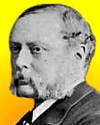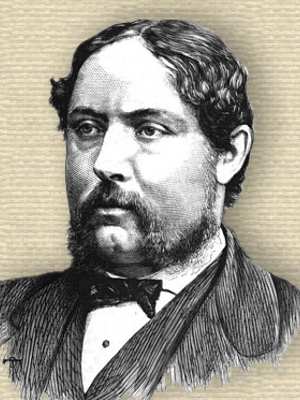 (source)
(source)
|
Richard Anthony Proctor
(23 Mar 1837 - 12 Sep 1888)
English astronomer who first suggested (1873) that meteor impacts caused lunar craters, rather than volcanic action. He studied the motion of stars, their distribution, and their relation to the nebulae.
|
RICHARD ANTHONY PROCTOR.
by John Fraser
from Scribner’s Monthly, Dec 1873
[p.172] ¶Ten years ago, the name of Richard Anthony Proctor was absolutely unknown; five years later, it was familiar in scientific circles in London, but comparatively unheard of outside; and to-day it is familiar as household words to every educated man in England, and to many thousands in this country. Yet, the man who in so brief a space has conquered fame, and attracted the respectful admiration of astronomers in both hemispheres, is only thirty-six years old now, and did not begin to study astronomy till he had passed his five-and-twentieth year.
Barely eight summers have flown since his maiden work appeared, and in the interval he has contributed a score of volumes to the library of science, some of them profound, many of them entirely original, and all of them thoroughly elevating and purely philosophic in tone. In addition to these works, Mr. Proctor has written constantly and voluminously in most of the leading English periodicals, and has fought successfully more than one brilliant and stoutly contested battle with some of the oldest and ablest savans in Europe.
Notably was this the case in his memorable struggle with the venerable Astronomer Royal of England, Sir George Airy, who had achieved a world-wide reputation, and had published seven or eight of the nine quarto volumes of his Astronomical Observations, before his young antagonist was born. The dispute in question arose out of the widely divergent views set forth, upon the one hand, by Airy, and, upon the other, by Proctor, as to the manner in which the approaching Transit of Venus might be utilized to the best advantage. Sir George Airy, having originally, by an unfortunate choice, adopted the approximate process in dealing with the abstruse calculations involved in the working out of this delicate problem, had been strongly advised by Mr. Proctor, so far back as 1869, to adopt by preference the exact process. Delisle’s method having been selected by Airy for the Transit of Venus in 1874, his keen-eyed critic at once pointed out that Halley’s method was in every way to be preferred, whereas in regard to the next Transit—that of 1882—Delisle’s would be better than Halley’s. He farther insisted, from the first, that the Astronomer Royal, in his selection of points of observation in Hindostan, had overlooked many of the most desirable. And the young astronomer was right in both instances, as is shown by the fact that the leading astronomers of England at their last meeting, in session at the Board of Visitation of Greenwich Observatory, were unanimous in urging the Government to adopt the suggestions made by Proctor four years before.
This is but one out of many similar instances which might be cited of the extraordinary courage, keenness of perception and farsightedness of this the youngest, and, in some respects, the most brilliant, of living astronomers. The career of such a man is surely deserving of study; and as Mr. Proctor is now in America, and many of our readers doubtless have listened to his lectures, a brief record of his life may prove not uninteresting.
¶
Richard Anthony Proctor was born at Chelsea, England, on the twenty-third of March, 1837. Through both his parents he was descended from good old English families. His father, William Proctor, was a gentleman of ample means, who had passed the English Bar, but never practiced. He came of an old north-country family, the eldest son of which, until the last, had been named Foster Thomas from time immemorial, the first eldest son not so christened being our astronomer’s elder brother, the Rev. William Addy Proctor, of Gravesend. Richard’s mother, whose maiden name was Mary Pyke, belonged to an old Somersetshire family, and her mother again, a Miss Leigh, was sister to the husband of Lord Byron’s sister, the Hon. Augusta. Although now robust and healthy, in his childhood Richard Proctor was thought to be delicate, for which reason he was educated at home by his parents until his eleventh year.As a child, he was a remarkable reader, never seriously taking up a book without reading it right through from the first page to the last—a practice which, by the way, he has long since dropped. As an instance of this youthful thoroughness of reading, a writer in the London Illustrated Review affirms that, when a boy, Proctor mastered, chapter by chapter, the whole of the late Sir Archibald Alison’s History of Europe; but [p.173] we can hardly credit the story. In 1848, he was sent to school at a large academy in Milton-on-Thames, where he remained until 1851, when he attained the proud position of head boy of the establishment.
In January, 1850, his father died, and the family were at once plunged into the miseries and vexations of a complicated series of suits in chancery, arising out of the mortgaged condition of a large property, of which, had Mr. Proctor lived, he would after a brief while have come into possession. This vexatious litigation—and Dickens has exposed to the world the delays and iniquities of a chancery suit—went on for three or four years, the result being that Mrs. Proctor and her children were reduced from affluence to very narrow circumstances.
Richard, in order to aid his mother, accepted a clerkship in the London Joint Stock Bank, in the summer of 1854, in which position he remained for fully a year, during which time he employed every spare moment in studying mathematics.
In the fall of 1855, things had so much improved, through Mrs. Proctor’s succession to the estate of her husband’s half-brother, that Richard was enabled to throw up his clerkship and enter his name as a student at King’s College, London. This was in October, and at the Christmas examinations, that same year, young Proctor, [p.174] then only eighteen, stood first in all his classes. After barely a year’s study at King’s College, he joined his elder brother at St. John’s College, Cambridge, shortly after which his mother died, and his chief incentive to labor and to wait having been thus removed, he seems to have lost all ambition for scholastic distinction. During the next two years, he never once attended an examination; and until within four days of his going before the examiners for his degree, he had not read mathematics at all, and of astronomy knew absolutely nothing. Notwithstanding this, he was twenty-third wrangler. In the January of 1860, he graduated as Bachelor of Arts, and before the year was out became a benedict.
During the first three years of his married life, Mr. Proctor directed his attention exclusively to history and literature; and it was only when the death of his first-born, in 1863, drove him to seek distraction in more engrossing studies, that he returned to his first love—mathematics, and began to study astronomy.
The first result of his new labors appeared in the form of a paper on “Double Stars,” published in the December number of the Cornhill Magazine for 1863, and in 1864 he began a series of investigations in regard to the great Ringed Planet of the Solar System, the fruits of which were ultimately embodied in his treatise on Saturn and his System. Out of his mapping labors in preparing this book grew his Economic Star Atlas, which, in turn, suggested his Handbook of the Stars.
This last volume was published in 1866, up to which time Mr. Proctor’s labors had been purely voluntary—the outcome of a natural mental bent. But a greater, and a distressingly painful incentive was supplied when, on the Black Friday of that year, his entire fortune was swamped by the failure of a bank that went down in the great commercial earthquake, which brought so many large houses and joint stock companies tumbling to the ground. Driven by necessity, Mr. Proctor lost no time in fruitless repining. He had a large family,—altogether he has had nine children, of whom three sons and two daughters survive,—and he did what so many have done under similar circumstances—he went up to London to seek his fortune. To this end he visited the various publishers, with the view of disposing of scientific treatises which he had written; but for three years he sought their aid in vain.
He was not the first author, whose writings afterwards brought fame and profit, who came through the same experiences. All the world knows how Shelley, to the last day of his life, had to pay for the publication of his own poems, and how Thackeray hawked round the MS. of his Vanity Fair. But Proctor was not the man to allow himself to be utterly disheartened. He persisted in writing; and if he could not get a publisher to issue his books, he could, and did, get his essays published in one or two leading magazines. Meanwhile his reputation was steadily on the increase in philosophic circles.
¶In the June of 1866 he was elected a member of the Royal Astronomical Society; and in 1868 he obtained a seat in its Council, which he resigned in 1869, but resumed in 1871. Last year he was chosen one of its Honorary Secretaries, a position to which he was again elected at the last general meeting of the Association a few months since. He is also an. Honorary Member of King’s College, and corresponding member of several foreign scientific societies. Meanwhile he was bringing out his books in rapid succession.
In 1867 appeared his Constellation Seasons, Sun Views of the Earth, and Charts of Mars, Planetary Orbits, &c. In 1868 he issued Half Hours with the Telescope, followed in 1869 by Half Hours with the Stars, and in 1870 he made his first really notable success in his singularly able and original volume, Other Worlds than Ours, which was published by the Messrs. Longman, of London, and met with an immediate and extraordinary success. During the same year, 1870, he produced his Large Star Atlas, followed twelve months afterwards by his volume on The Sun, his admirably arranged and well compacted Elementary Astronomy, as well as his first series of Light Science for Leisure Hours. Last year he published no fewer than five books—Essays on Astronomy, School Atlas of Astronomy, Orbs around Us, Elementary and Physical Geography, and Chart of 324,000 Stars. During the present year has appeared the second series of Light Science for Leisure Hours, and at the present moment, we believe, he is preparing for publication a volume on the Transit of Venus, and has in press one bearing the attractive title of The Borderland of Science.
From this brief resumé of his labors it will be seen how much valuable and lasting work [p.175] Mr. Proctor has contrived to crowd into a few years. As an Astronomer and Mathematician he stands in the front rank of scientists, and to the most assiduous application and untiring industry he adds a brilliance of imagination, lucidity of style, and a daring originality of purpose that give him a distinct and honorable place among the select and illustrious few who have widened the boundaries of exact knowledge, and devoted great intellectual power to the elucidation of some of the grandest themes in the arcana of the sciences.
- 23 Mar - short biography, births, deaths and events on date of Proctor's birth.





